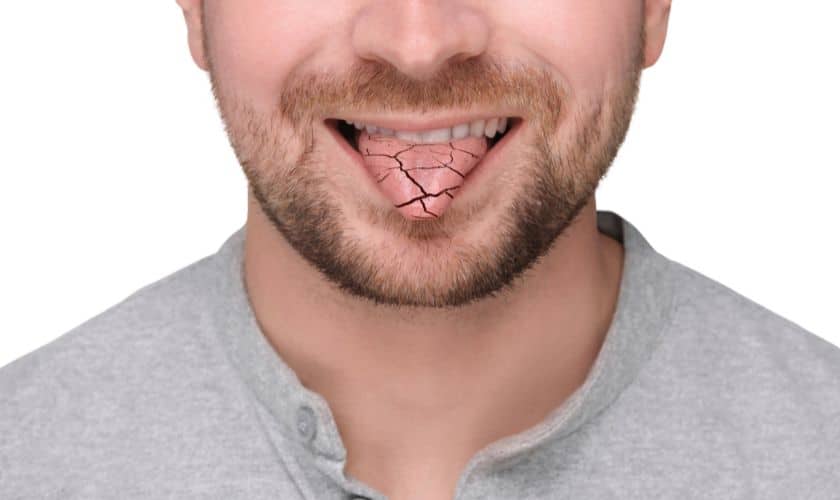
Your gums are a very important aspect of your oral health. If they dry out, this can cause a wide range of problems for your entire mouth. The problems can range from something simple, like gum disease which is easy to treat in most cases, to tooth loss, which is much more difficult to treat.
It is very important that you keep your mouth moist with saliva, especially your gums. This protection keeps the gums healthy, plus that helps keep the teeth healthy. For those who struggle with dry mouth, you need to take steps to keep your mouth as moist as possible.
Dry Mouth Takes A Toll On Your Oral Health
There are some medications that can cause problems with dry mouth. It is often one of the lesser-noticed side effects. If you think that your medication is causing the issue of dry mouth, it is important that you speak with the prescribing doctor to see if you have any other medications you can try.
If you regularly struggle with dry mouth, call us. We can take a look at your mouth and see if we can determine the cause of your dry mouth problems. Once we figure out the cause, we can then help you figure out the most effective treatment. We can then also formulate a plan to treat any leftover issues that may have come up since you started to struggle with dry mouth. Contact us today!
The Importance of Saliva
Before delving into the connection between dry mouth and gum health, it’s crucial to understand the role of saliva in maintaining a healthy mouth. Saliva is not just water; it’s a complex fluid containing enzymes, proteins, and minerals that serve various essential functions in the oral cavity.
- Moisturizing the Mouth: Saliva helps keep the mouth moist and comfortable, making it easier to speak, swallow, and chew.
- Digestion: Saliva contains enzymes that begin the digestive process, breaking down food particles and making it easier for your body to absorb nutrients.
- Neutralizing Acids: Saliva helps neutralize acids produced by bacteria in the mouth, preventing tooth decay and gum disease.
- Antibacterial Properties: Saliva contains proteins and antibodies that help control the growth of harmful bacteria in the mouth.
- Wound Healing: Saliva promotes the healing of small wounds and injuries in the mouth.
- Lubrication: Saliva provides lubrication for the tissues in the mouth, reducing friction and irritation.
Dry Mouth and Its Causes
Dry mouth occurs when there is a decrease in the production of saliva or a change in its composition. Several factors can contribute to this condition:
- Medications: Many commonly prescribed medications have dry mouth as a side effect. These include antihistamines, decongestants, antidepressants, and certain blood pressure medications.
- Medical Conditions: Certain medical conditions, such as diabetes, Sjögren’s syndrome, HIV/AIDS, and autoimmune disorders, can affect salivary gland function, leading to dry mouth.
- Dehydration: Not drinking enough water can lead to temporary dry mouth. It’s essential to stay adequately hydrated throughout the day.
- Radiation Therapy: Individuals undergoing radiation therapy for head and neck cancers may experience damage to their salivary glands, resulting in chronic dry mouth.
- Smoking and Tobacco Use: Smoking and the use of tobacco products can contribute to dry mouth and increase the risk of gum disease.
The Connection Between Dry Mouth and Gum Health
Now that we understand the importance of saliva, let’s explore how a dry mouth can affect your gum health:
- Increased Risk of Gum Disease: Saliva plays a crucial role in maintaining a healthy balance of bacteria in the mouth. When saliva production decreases due to dry mouth, harmful bacteria can multiply and thrive. This can lead to an increased risk of gum disease, including gingivitis and periodontitis.
- Gum Inflammation: A dry mouth can cause the gums to become dry and inflamed. Inflamed gums are more susceptible to bleeding, pain, and sensitivity, which are common symptoms of gum disease.
- Reduced Healing Capacity: Saliva contains growth factors and enzymes that aid in the healing of damaged gum tissues. A dry mouth can impede the body’s ability to repair and regenerate gum tissue, making it more difficult to recover from gum problems or procedures like gum surgery.
- Tooth Decay: As mentioned earlier, saliva helps neutralize acids and remineralize tooth enamel. Without enough saliva, the protective mechanisms against tooth decay are compromised, leading to an increased risk of cavities and tooth sensitivity.
- Bad Breath: A dry mouth often results in bad breath or halitosis. This is because saliva helps cleanse the mouth and remove food particles and bacteria. When saliva production is reduced, bacteria can flourish, leading to unpleasant odors.
Managing Dry Mouth and Protecting Your Gum Health
If you’re experiencing dry mouth, it’s essential to take steps to manage the condition and protect your gum health. Here are some strategies:
- Stay Hydrated: Drink plenty of water throughout the day to help maintain moisture in your mouth. Avoid excessive consumption of caffeine and alcohol, as they can contribute to dehydration.
- Sugar-Free Gum and Candy: Chewing sugar-free gum or sucking on sugar-free candy can stimulate saliva production. Look for products that contain xylitol, which may have additional dental benefits.
- Avoid Tobacco: If you smoke or use tobacco products, consider quitting. Tobacco use not only contributes to dry mouth but also increases the risk of gum disease and oral cancer.
- Medication Review: Consult with your healthcare provider or dentist to review your medications. If dry mouth is a side effect of any medication you’re taking, they may be able to adjust your treatment or recommend alternatives.
- Oral Hygiene: Maintain a rigorous oral hygiene routine to reduce the risk of gum disease. Brush your teeth at least twice a day, floss daily, and use an antimicrobial mouthwash as recommended by your dentist.
- Saliva Substitutes: Your dentist or periodontist may recommend saliva substitutes or artificial saliva products to help alleviate dry mouth symptoms.
- Regular Dental Visits: Schedule regular dental check-ups and cleanings with a periodontist in Houston. They can monitor your gum health and provide guidance on managing dry mouth.
Final Thought
Dry mouth is not just a minor inconvenience; it can have a significant impact on your gum health and overall oral well-being. If left unmanaged, it can increase the risk of gum disease, tooth decay, and other oral health problems. Therefore, it’s crucial to be proactive in addressing dry mouth and seeking the guidance of a periodontist in Houston for specialized care and advice. Remember that a healthy mouth is a key component of your overall health, so don’t underestimate the importance of maintaining proper oral hygiene and addressing dry mouth promptly. Your gums will thank you with a healthy, beautiful smile.

